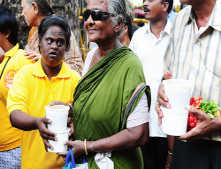Attending To Basic Goodness

With the mounting influence of dominant cultures, the propaganda and stronger coercive, even military, power that we seek to emulate — rather than of cultures promoting equality, justice and well-being — we struggle to find ways to define what constitutes right conduct, at both personal and collective levels.
 The simple yet profound lesson of ‘Basic Goodness’ is a teaching that many Buddhist teachers place before us; it is a reminder of what is acutely needed.
The simple yet profound lesson of ‘Basic Goodness’ is a teaching that many Buddhist teachers place before us; it is a reminder of what is acutely needed.
According to the Dalai Lama, our survival has depended and will continue to depend on our basic goodness as human beings. He continues to believe and teach that there is far more good than evil in this world.
Tibetan spiritual teacher Chögyam Trungpa, through his Shambhala teachings, perhaps had done the most to spread the idea of our basic goodness, which is a core concept in his teachings, embracing both the nature and experience of reality, and also basic human virtue. It is something innate in us.
This core belief is rooted in Buddhist psychology and based on the notion that all people are fundamentally good, their most basic qualities being positive ones: openness, intelligence and compassion. This viewpoint has its philosophical and psychological expressions in traditional concepts such as bodhichitta, awakened mind, and tathagatagarbha, meaning birthplace of the enlightened ones, but used in the connotation of Buddha-nature. But, Trungpa, emphasises, “… this idea is ultimately rooted in experience of goodness and worthiness in oneself and others.”
Basic Goodness isn’t something we find or create; it is often something we have to uncover. It gets submerged in the process of constructing our versions of who we think we are, or who we should be, and of the world in which we live. We settle into convenient though often inaccurate patterns of assumptions, emotions, thoughts and actions, through which we deal with everyday life. In time, these become rooted and fixed, and while they may create a protective shield for us, they also blind us to the basic goodness in ourselves and others.
This does not mean we are to deny the pain of tragic experience, or fear, anxiety, anger, injustice and violence. Basic goodness does not lie somewhere beyond these very human experiences, but rather in them. To say that we are basically good means that we have every faculty we need to handle things wisely, and to create a peaceable and just world.
Richard Davidson is a neuroscientist, who makes our understanding of the role of the brain in our behavioural and life choices accessible, and teaches from a Buddhist perspective. He invites us to consider an alternative to the traditional New Year’s resolution. “Instead of focusing on a behaviour we wish to change or habit we may not like, reflect on the possibility of strengthening or nurturing those parts of yourself that reflect your basic goodness.”
A simple way to sustain this approach is to “become more aware of it when it is there.” As with many wonderful things, though this is simple, it may not be easy! Goodness often speaks to us in a softer voice and tone, unlike anger and violence that is loud and strident. So, unthinkingly, most of us have slipped into a pattern of overlooking basic goodness, ignoring or minimising its importance.
At a deeper level we do understand that what we focus on is likely to grow, so focusing on this nurturing and nourishing aspect of ourselves — basic goodness — is a sure way to have more of it in our lives.








